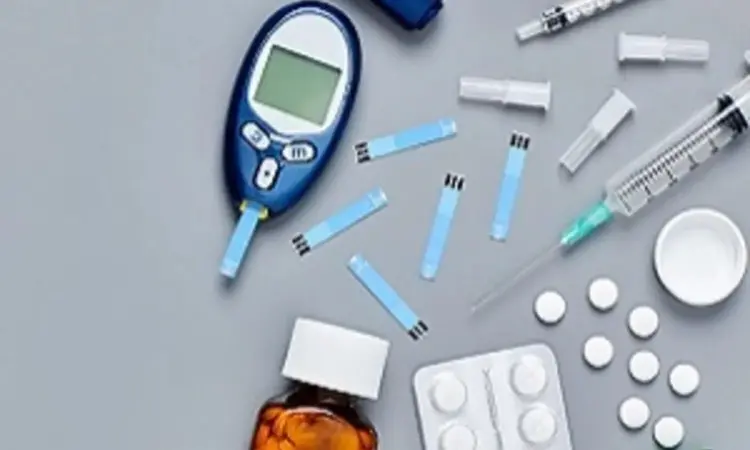- Home
- Medical news & Guidelines
- Anesthesiology
- Cardiology and CTVS
- Critical Care
- Dentistry
- Dermatology
- Diabetes and Endocrinology
- ENT
- Gastroenterology
- Medicine
- Nephrology
- Neurology
- Obstretics-Gynaecology
- Oncology
- Ophthalmology
- Orthopaedics
- Pediatrics-Neonatology
- Psychiatry
- Pulmonology
- Radiology
- Surgery
- Urology
- Laboratory Medicine
- Diet
- Nursing
- Paramedical
- Physiotherapy
- Health news
- Fact Check
- Bone Health Fact Check
- Brain Health Fact Check
- Cancer Related Fact Check
- Child Care Fact Check
- Dental and oral health fact check
- Diabetes and metabolic health fact check
- Diet and Nutrition Fact Check
- Eye and ENT Care Fact Check
- Fitness fact check
- Gut health fact check
- Heart health fact check
- Kidney health fact check
- Medical education fact check
- Men's health fact check
- Respiratory fact check
- Skin and hair care fact check
- Vaccine and Immunization fact check
- Women's health fact check
- AYUSH
- State News
- Andaman and Nicobar Islands
- Andhra Pradesh
- Arunachal Pradesh
- Assam
- Bihar
- Chandigarh
- Chattisgarh
- Dadra and Nagar Haveli
- Daman and Diu
- Delhi
- Goa
- Gujarat
- Haryana
- Himachal Pradesh
- Jammu & Kashmir
- Jharkhand
- Karnataka
- Kerala
- Ladakh
- Lakshadweep
- Madhya Pradesh
- Maharashtra
- Manipur
- Meghalaya
- Mizoram
- Nagaland
- Odisha
- Puducherry
- Punjab
- Rajasthan
- Sikkim
- Tamil Nadu
- Telangana
- Tripura
- Uttar Pradesh
- Uttrakhand
- West Bengal
- Medical Education
- Industry
Intensive Glycemic Control Did Not Affect Diabetic Eye Changes in 1 Year, reveals research

Researchers have identified in a new study that tight blood sugar control within a period of one year did not have a notable impact on changes in diabetic retinopathy (DR) in patients with type 2 diabetes mellitus (T2DM). Although intensive glycaemic control is universally advised for minimizing the long-term complications of diabetes, its impact on diabetic eye disease in the short term is unclear. This new research offers valuable information, proposing that more stringent control of blood sugar during a 12-month period will not be able to prevent or reverse changes in DR during the same time. The study was published in BMC Ophthalmology by Xinyan Wu and fellow researchers.
There is substantial evidence that tight glycemic control—usually defined as having hemoglobin A1c (HbA1c) values less than 7%—will decrease the risk of diabetes complications, including diabetic retinopathy, over a long term. But whether it is effective to change the trajectory of DR in the short term remains to be seen. Diabetic retinopathy is a prevalent microvascular complication of T2DM and a major cause of blindness globally. The present study sought to establish whether attempting more intensive HbA1c targets influenced DR changes during 1 year, according to comprehensive eye evaluation and standardized grading schemes.
The research involved 254 adult patients with T2DM, all of whom were more than 7% at baseline HbA1c. Participants were followed by researchers for 12 months, and HbA1c values at baseline and follow-up were obtained. Participants were grouped based on the 12-month HbA1c levels:
• Intensive glycemic control group: 129 patients attained HbA1c < 7%
• Less intensive control group: 125 patients had HbA1c ≥ 7%
The severity of diabetic retinopathy was graded with seven-field 45° conventional fundus photographs, and DR status changes—incidence, progression, and regression—were graded by UK National Diabetic Eye Screening Program guidelines. Data were also adjusted for age, gender, and other confounding factors such as BMI, blood pressure (systolic and diastolic), diabetes duration, insulin use, and baseline HbA1c.
Key Findings
• Total participants: 254 T2DM patients with baseline HbA1c > 7%
• The follow-up duration was: 12 monthsThe intensive glycemic control was attained by: 129 patients (HbA1c < 7%)
• The less intensive group consisted of: 125 patients (HbA1c ≥ 7%)
• Outcome: No substantial difference in DR incidence, progression, or regression between the two groups
• Adjustments: Incorporated age, gender, BMI, SBP, DBP, duration of diabetes, insulin therapy, and initial HbA1c
The study reaches the conclusion that intensive glycemic control within 12 months has no significant effect on short-term changes in diabetic retinopathy in patients with T2DM. These results reinforce the necessity for ongoing long-term observation and overall management plans for diabetic eye disease.
Reference:
Dr Riya Dave has completed dentistry from Gujarat University in 2022. She is a dentist and accomplished medical and scientific writer known for her commitment to bridging the gap between clinical expertise and accessible healthcare information. She has been actively involved in writing blogs related to health and wellness.
Dr Kamal Kant Kohli-MBBS, DTCD- a chest specialist with more than 30 years of practice and a flair for writing clinical articles, Dr Kamal Kant Kohli joined Medical Dialogues as a Chief Editor of Medical News. Besides writing articles, as an editor, he proofreads and verifies all the medical content published on Medical Dialogues including those coming from journals, studies,medical conferences,guidelines etc. Email: drkohli@medicaldialogues.in. Contact no. 011-43720751


